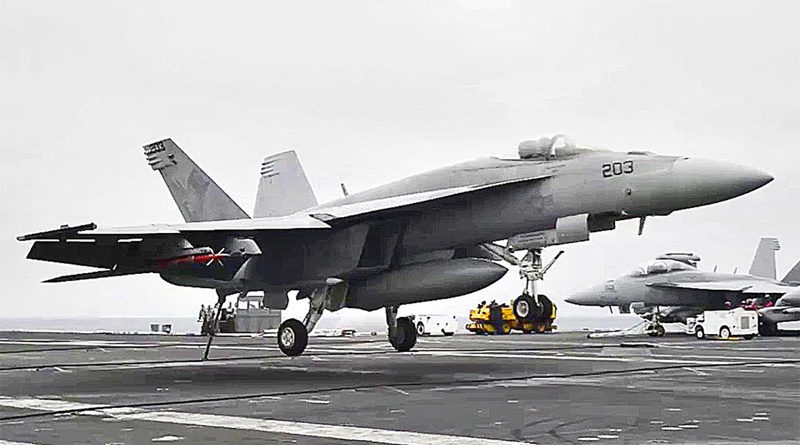Indian Navy may Opt For F-18 Super Hornets Over Russian MiG-29K
29 February, 2020
To make a pitch for India’s carrier-based aircraft procurement program, the US-based Boeing has announced its plans to test its F/A-18 Super Hornet jet on a carrier ski-jump. This announcement came at the backdrop of Russia awaiting an order form India to supply its MiG-29K jets for the same program. So which one should India opt for – F/A-18 Super Hornets or MiG-29K jets?
Currently, India operates just one carrier – a former Soviet vessel, Vikramaditya which embarks the MiG-29K fighters made by Russia. However, India’s second carrier, the first to be built in the country, is underway and can be commissioned by March 2021.
While Vikramaditya embarks a fleet of 45 MiG-29Ks, New Delhi wants to buy 57 new naval fighters to complement MiGs that would embark on the new indigenous carrier.
The latest news is that the Boeing F/A-18 has made a fresh entry to embark on India’s first indigenous carrier. Before the decision is made, the Boeing F/A-18 will be expected to be tested and certified for ski-jump operation. Thom Breckenridge, the Vice President of Being International Sales, during the Defexpo2020 Indian arms show, said, “Testing plans are underway. We will rigorously check our aircraft on the ski jump.”
The Russian aviation industry was quoted in the media saying, “Russia is waiting for a request from the Ministry of Defence of the Government of India for the delivery of the MiG-29K for the same.” Indian Defence Ministry hasn’t issued a tender yet for the supply of the deck-based fighter aircraft but in 2017, the Ministry had made a relevant inquiry regarding the same.
The arrival of Boeing has heated up the conversation around the fighters that Vikrant will embark on. The comparisons on several fronts between Boeing F/A-18 and MiG-29K have inevitably surfaced.
A twin-engine, multirole, carrier-capable aircraft, the Boeing F/A-18 Super Hornet fighter jet is the variant of the McDonnell Douglas F/A-18 Hornet. A single-seat fighter jet, Super Hornet can carry air-to-air missiles and also air-to-surface weapons. It has an internal 20mm M61 rotary cannon that helps it to carry the missiles.
The MiG-29K, a 4+ generation Russian fighter jet, has a multi-function radar and hands-on-throttle-and-stick (HOTAS) controls. Like Boeing, it also carriers air-to-air missiles but due to the integration of RVV-AE, it also carriers anti-ship and anti-radar operations and several surface precision-guided weapons.
The MiG-29K is a different beast altogether. Considered among the most capable of its generation with a host of new weapons and sensors, this fighter could threaten several heavyweight contemporary western fighters including F-15 and F-16.
The baseline Super Hornets have a top speed of 1190 miles per hour, armed with AIM-9 Sidewinder, AIM-7 Sparrow and AIM-120 AMRAAM missiles with a range of 1243 miles. The MiG has a lowered range of 889 miles but a higher top speed of 1519 miles per hour. It carrier the AA-10 Alamo and AA-11 archer air-to-air missiles.
In air combat, which of these fighters would win? The MiG-29’s speed and the power of the AA-11 archer give it an advantage in a close-in dogfight, however, Hornet offers better situational awareness for the pilot which is key in combat.
India is yet to issue a tender and make a formal request as both Russia and the United States are close competitors yet again. As Vikrant is due to be delivered to the Indian Navy in the first quarter of 2021, it will be interesting to see who will India go ahead with.
Courtesy: Opera News/ indiandefensenews.in

